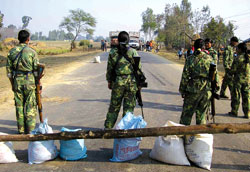|
|
When I was growing up in Nepal, it was de rigueur to blame the Ranas for our woes. History books, written during the Panchayat system, told us how King Tribhuban had liberated us from 104 years of repressive Rana rule.
But we've continued to hear that we aren't really liberated. There was a period of democracy, crushed by King Mahendra and replaced with his vision, the Panchayat system. Multiparty democracy in 1990 was another attempt at 'real' liberation, though after that we continued to observe independence day to mark liberation from the Ranas. (Liberation from the Panchayat system was obliquely relegated to \'constitution day\' under some face-saving arrangement.) The Maoists, the most vocal and nihilistic of the lot, started looking for \'true\' liberation in a complete overhaul of Nepali society, politics, and culture.
Aided by an institution that exposed its lack of modernism, we witnessed the eruption of Jana Andolan II this April. The Maoists rode this wave with the SPA, but for a few crusty political reactionaries and intense international pressure, might have already handed us their version of liberation.
Politicians and civil society 'activists' tell us we're on the verge of a 'historic' moment that will bring Nepalis the elusive permanent peace, and also create a model for the rest the world.
Apparently we're are on the brink of updating Gandhi and the UN's peace playbook and showing those interfering westerners, particularly the US, the folly of their misguided scepticism.
What a great idea.
Except there's the issue of 13,000 lives lost, thousands more displaced, still more children abducted. The Maoists may casually say this is the price of revolution, but the calculus of morality and warfare suggests that armies of liberation should leave significantly more people free in their wake.
And despite the best efforts of Maoist apologists, it's clear that the Maoists extort and exploit the very individuals they set out to free, suppress legitimate entrepreneurship, press freedom, individualism, and rationality.
In the face of warnings from principled analysts who have studied Marxist theory and armed political insurgencies, civil society activists and the media continue to put forth alternative theories and apologies.
While the monarchy refused to accept modernity, our activists and many in the media represent a curious blend of hyperactive postmodern thinking, and intellectual elitism. An indulgent obsession with the monarchy as the root of all evils facing our society has been overblown.
Thus we pass ridiculous (and impotent) legislation condemning the recent Thai coup, while we cannot provide basic security for ourselves. We fantasise about creating 'new' peace paradigms. We believe easy explanations of 'interference' from foreign powers. We can weigh in with easy sound bites on George Bush but are indifferent to the atrocities of the Maoists. The real victims of Maoists cannot protest against the Maoists (their leaders routinely get shot) but must do so against the government, which for many today exists as an abstraction. The media, so vocal and self-righteous about the monarchy, has lost its voice against the Maoists.
But there are some hopeful signs: some politicians finally seem to be taking what diplomats are saying at face value and some civil society activists and others in the media are beginning to sound strident tones against Maoist atrocities. The FNCCI, which previously garlanded Maoist leaders, is beginning to make its voice heard but not without being admonished for protesting.
Time will soon tell if we will be liberated once more.




